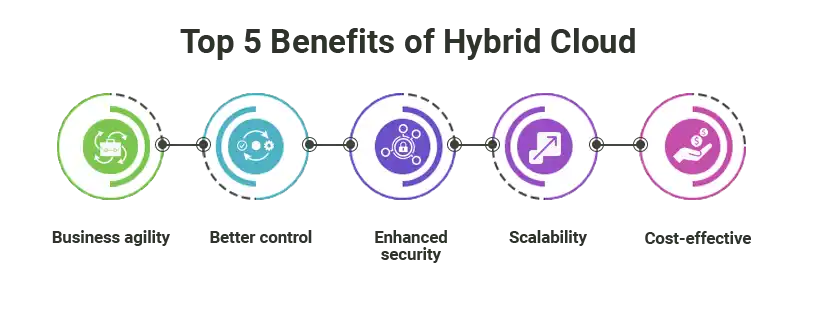Research
Share Knowledge
Brainstorm Ideas
Achieve More
As an Enterprise CIO, you could have hardly predicted a few years back how the year 2020 would impact your business. By March of last year, the COVID-19 pandemic had significantly impacted the way global and local companies managed their business operations and strategies.
Among the major disruptions, we saw a sudden shift towards remote working for employees and IT infrastructures being moved to the cloud. Among the interesting statistics for 2020, one-third of IT budgets are now reserved for cloud services – and the adoption of the hybrid cloud is now pegged at 58%.

Image source:Forbes
While we still cannot predict what 2021 has in store, it’s a safe bet that the hybrid cloud platform will continue to shape the post-COVID world. How can you as an enterprise CIO leverage the hybrid cloud? Let us look at some of its benefits and challenges.
With business users or customers consuming ever more data, there is a clear business trend towards adapting scalable public cloud solutions. On the other hand, private cloud solutions provide the necessary security for sensitive data.

By combining these two, hybrid cloud provides the best of both worlds with the following 5 benefits:
In today’s fast-changing world, business agility is key to adapting to changing business environments and customer expectations. A Gatepoint Research survey revealed that 84% of the respondents want to react quickly to any new market opportunities. Hybrid cloud – with the mix of public and private cloud options – allows organizations to achieve higher business agility and flexibility.
To achieve agility, organizations are using the hybrid cloud to create a common and seamless cloud infrastructure for many public & private cloud setups – without being locked into any single cloud service provider.
As a Cloud IaaS, public cloud offers lesser control over data that could be located over any geography or cloud server premise. Hybrid cloud options offer much better control as you do not entrust your entire IT infrastructure (and data and tools) to a third-party cloud service.
In today’s fast-growing economy, a hybrid cloud allows you to reconfigure the cloud environment and manage critical business data – without any major disruption to your ongoing processes.
The 2020 State of the Cloudreport by Sophos Research reveals that three in every four organizations hosting data on the public cloud have been hit by cyberattacks. Fundamentally, the public cloud remains more vulnerable to cyberattacks as compared to private networks.
With a hybrid cloud model, you can leverage the security aspect of the private cloud – through data encryption technologies and stricter data protocols. Going forward, security-related technologies like Fully Homomorphic Encryption and Confidential Computing are poised to drive the business move towards the hybrid cloud model.
Obviously, before the advent of public cloud services, organizations could only scale up their business operations by investing in expensive physical servers. In-house servers also limit the overall agility of the business in responding to changing market needs.
The hybrid cloud environment offers the best in scalability in both private and public cloud networks. While the main organizational workload can be run on the private cloud, the public cloud can still handle any spontaneous increase in data usage or workloads as well as address backup and disaster recovery strategies.
A hybrid cloud service can also be cost-effective – mainly due to the "pay as you use" model of the public cloud element within the hybrid model. The high scalability factor of a hybrid cloud is an attractive cost alternative to the private cloud model, which requires businesses to make continuous investments to manage their growing data volumes.
With critical business data stored in private networks, hybrid clouds also make it easier to migrate their public data from one cloud provider to another – thus reducing the overall migration costs.
A 2020 Gartner study concludes that 90% of organizations will move to a hybrid cloud environment.

Image source:CloudOYE
However, hybrid cloud implementation is not always smooth and has its share of challenges:
Most organizations often get stuck at the first step of cloud implementation, which is migrating the data stack and applications from an in-house IT setup to the hybrid cloud. Some the common bottlenecks include:
o Lack of in-depth understanding of the cloud options most apt for their specific needs. To add to this, it’s also hard to acquire cloud professionals with cloud deployment skills.
o On-premises applications that are not compatible with a third-party cloud platform.
o Poor integration within various cloud platforms due to proprietary or native functionalities.
Most hybrid cloud services allow you to dynamically consume memory bandwidth and other resources – depending on your application workload. As a cloud expert, you need to accurately estimate the required capacity of your virtual machine. Improper estimation and poor control and monitoring can easily end up in more resource consumption, thus increasing the overall costs. As a result, proper cost management is a challenge in hybrid cloud computing.
With the increase in data theft and breaches, data compliance and regulations with regards to the safe storage of customer data is a major challenge with approaches. Cloud developers are often not trained in the intricacies of data compliance management, which is handled by the IT operations team.
Apart from data storage, compliance-related issues also include data security and disaster recovery.
As a CIO, you do not need a crystal ball to predict the impact of hybrid cloudin business transformation over the next decade. This is now a given. Having said that, data-driven companies need to adopt hybrid cloud technology efficiently to gain maximum business benefits – while dealing with its few challenges. The best way forward may be to ally with an expert who can provide the advisory, consulting, and implementation services to make the strategy possible.